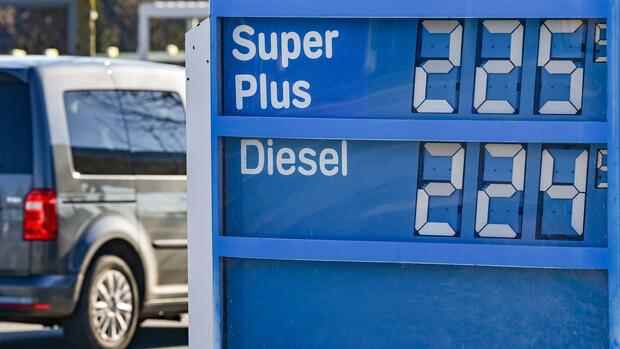Fuel prices in Germany are currently reaching new record highs every day.
(Photo: dpa)
Berlin Until recently, a fuel price of more than two euros was considered unlikely, but now it is a reality for the first time in the history of the Federal Republic. And it’s already going up. In view of the price jumps, calls are being made in politics for further relief for citizens.
The energy policy spokeswoman for the SPD parliamentary group, Nina Scheer, was open to lowering VAT on petrol from 19 to seven percent. “VAT reductions are also among the possible options,” Scheer told the Handelsblatt.
At the same time, the SPD politician emphasized that there are still “relatively greater challenges in the heating market in view of the gas prices”. “And here, too, it must be said: The energy price crisis is a fossil crisis,” emphasized Scheer. “We have to overcome our dependence on fossil fuels and switch to renewable energies as quickly as possible, while also accelerating the transport transition.”
Chancellor Olaf Scholz had already announced that he would take further measures if energy prices rose too much. In an online event organized by the SPD North Rhine-Westphalia on Monday, the chancellor pointed out that the traffic light government had already decided on a package of measures, for example with the earlier abolition of the EEG surcharge, in order to find compensation for the high energy prices for employees and low earners.
Top jobs of the day
Find the best jobs now and
be notified by email.
The government is also trying to better cushion the development on the energy markets and the sharp rise in prices. “If that is not the case, we will have to look at further measures,” he said. “We have taken a first big step, but are ready to take more if the situation does not change.”
CSU politician: “Rapidly increasing energy prices are the social issue of the time”
Federal Finance Minister Christian Lindner is currently not planning any further relief for citizens due to the rise in fuel prices. However, he also said: “I am not ruling out anything for the further development of this year. At the moment, however, no new decision is pending.” Lindner emphasized that the state cannot compensate for rising costs for energy imports in the long term, but at best can temporarily cushion them and balance them socially.
The fact that refueling in Germany is more expensive than ever is a result of the Russian aggression against Ukraine. The main driver of the increase at the pump so far has been oil prices, which have shot up in the wake of the conflict in Ukraine. By Tuesday noon, oil prices had initially stabilized after the sharp rises of the previous days, but later in the afternoon they rose again significantly.
>> Read also: Fuel prices are already over two euros per liter – there is no end in sight to the increase
The currently strong dollar amplifies the effect of rising oil prices as oil is traded in dollars and German buyers pay in euros. In addition, the price of diesel will continue to be driven by high demand for the similar heating oil and importers will reduce imports of diesel from Russia.
The development is also driving the debate about relief. “The rapidly rising energy prices are the social issue of the time. Quite a few people are wondering how they should shoulder the exploding energy prices, ”CSU consumer politician Volker Ullrich told the Handelsblatt.
Saar Prime Minister Hans plans Federal Council initiative
He advocates a reduction in VAT on electricity, gas and petrol to seven percent. The commuter allowance must also be increased – in a first step immediately from the first kilometer to 35 cents and from the 21st kilometer to 40 cents. “The federal government must now act decisively and very clearly with a high volume of relief when it comes to the relief,” emphasized Ullrich.
Saarland’s Prime Minister Tobias Hans (CDU) also called on Twitter for the federal government to reduce taxes on the price of petrol. The state “enriches” itself. The background is that, for example, revenue from VAT automatically increases when the price increases.
“Therefore, the VAT for fuel must be reduced from 19 to seven percent in the short term. That helps the end consumers, but not the companies,” Hans told the editorial network Germany (RND). He will also strive for a Federal Council initiative.
The Green consumer politician Tabea Rößner warned against hasty measures. “One thing is clear: price developments are having a particularly strong impact on low incomes. Therefore, consumers must be relieved,” Rößner told the Handelsblatt. “But we have to take a close look at which measure is best suited for this and discuss it calmly.”
More: Biden announces new sanctions: US stops imports of Russian oil
